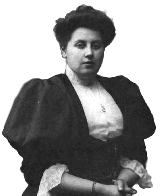Biographies - Anna Vyrubova
Anna Alexandrovna Vyrubova

Anna Alexandrovna Vyrubova was the daughter of Alexander Sergievich Tanieff, who was a famous composer and Director of the Private Imperial Chancellery. Anna had a brother, Serge and a sister Aleksandra. They lived the typical life of a young Russian noble children. Summers were spent on the family estate near Moscow, which was close by Sergey and Elizabeth's estate of Illinskoe. Anna first met Aleksandra at a children's tea on a visit there. Her first sight of the Empress was like a fairy tale vision for little Anna. Aleksandra had only recently come to Russia, was in her mid-twenty's and was a ravishing beauty. The Empress grew to trust and rely on Anna's father and he fulfilled many assignments for her.
At seventeen Anna was formally presented to the Dowager Empress. Coming out into society was a major event in a young noblewoman's life. The number of balls, teas, dinners and receptions she was expected to attend were amazing. Anna was exhausted by the swirl of social events and came down with typhus, a dreaded illness in unsanitary Petersburg. She was ill for three months and became even more seriously ill. She felt near death when she had a vision of St. John of Kronstadt, who told her she would live. The holy man was asked to come to her house where he sprinkled holy water over her and she became better almost immediately.
In 1903 Anna received the diamond studded pin of a maid of honor and attended the great mediaeval ball at the Winter Palace, where the entire court dressed in the robes of 17th century Muscovy. Photographs of Anna show her and her sister, gracefully holding one another in pearl trimmed head-dresses. They danced with 18 other young noblewomen and an equal number of young noblemen in an old Russian dance. Being a maid of honor she found herself closer and closer to the Empress, who became an even bigger influence in Anna's life. That summer Anna became ill again. Aleksandra came to visit her which signalled her growing affection for the young woman who became like a daughter to her. In 1905 Anna was summoned to Tsarskoe Selo to fill in for Sonya Orbeliani, a lady-in-waiting to the Empress who became ill. She was given rooms in the Imperial Lyceum, near the Catherine Palace, which Anna found depressing and cold. Thus began her short official role at court.
The position of lady-in-waiting was a circulating job; once Anna's one month term of duty was up she went home. The following summer Anna and her family saw a good deal more of the Imperial family than they ever had before. Anna noticed she was being treated more and more like a family friend, which became clear when she was invited for a cruise on the Imperial yacht, Polar Star. Nicholas and Aleksandra both liked aspects of Anna's personally that others found grating and boorish. Anna had simple emotions and attached herself to the family naturally, like she had always been a part of their lives. She was totally absorbed with their lives and willingly placed herself at the beck and call of the Empress. She acted as if Aleksandra was her best and only friend, mother and Empress - all of these were qualities that endeared her to Aleksandra. The Empress was an all-consuming friend. She expected her friends to 'want' to focus their lives upon hers - not doing it out of duty to the throne. Anna was perfectly loyal to the Imperial family throughout her life. She was a close friend to the young princesses as they grew up and also became a sort of a scout or listening post for Aleksandra.
At Aleksandra's urging Anna married a man, who had survived the Russo-Japanese War with shattered nerves, named Vyrubov. Rasputin predicted it would turn out badly, which scared Anna, but she went through with the marriage. When he drank he often became violent, which seemed to happen all the time. Worse of all for Anna he was unable and unwilling to consummate the marriage. After a frightful, but luckily short, period of time together they separated and the marriage was annulled. Since Aleksandra felt personally responsible for this disaster, she felt even more liable for Anna's well-being. The family had lots of nicknames for Anna, one affectionate name was "The Big Cow". She was considered overweight by the Empress who was always conscious of her daughters - and her own - waistline. In the days of wasp waists and corsets it is true that Anna's figure didn't fit current conventions of beauty. This went further than the close circle of the Imperial family into St. Petersburg society as a whole, which seemed obsessed with her. They called her frumpy, ill dressed and resented her closeness to Aleksandra. They felt they themselves deserved the intimacy of the Imperial family that Anna enjoyed. Men and women in fashionable circles gossiped constantly about Anna's supposed stupidity, meddling in politics, boorishness and devotion to Rasputin.
Anna lived in a small, very chilly house just outside the palace gates. Aleksandra used to visit Rasputin there, since Anna saw him frequently and his visits to Anya's weren't entered into the official Court Register like they were when he visited the palace.
People considered Anya to be very stupid. She has this reputation even today when she is looked upon as typical of the non-entities that were supposed to have surrounded the Imperial family. This picture of Anna is unfair. She had little initiative, but she didn't take advantage of her position with the Imperial Family for her own benefit.
Anna, along with Rasputin, became the focus of growing public hostility. It is amazing that such a simple, unaffected woman should have generated such hatred. She became a scapegoat for much of the hostility that might have otherwise been directed right at the Empress herself.
During the First World War she was seriously injured in a railroad accident on the tracks between Tsarskoe Selo and Petersburg. Anna was near death when Rasputin came to her bedside, calling "Annushka, Annushka, rise!". Amazingly she responded and awoke. Rasputin, covered in sweat from the ordeal, withdrew from Anna's room with the prophecy that she would henceforth be a cripple - and so she was. After Rasputin was murdered Aleksandra had Anna moved into the palace for safety's sake. This was a wise move, for Anna was hated almost as much as Rasputin. She stayed on the opposite side of the palace from the family. When the Imperial children became sick with mumps Anna caught them as well. The scene at her bedside was a something of a macabre circus, and Anna played the invalid to an embarrassing level. This was not a time for theatrics, but Anna was never brave when sick. For once she was unable to come to her Empress' aid. That task was left to Aleksandra's loyal friend, Lili Dehn, and the Empress' sick daughters.
After the Revolution Anna was taken by force from the palace and was imprisoned for months in a cell at the Peter and Paul Fortress by Kerensky. She was badly treated and abused by her captors. In the end, charges that she meddled in politics were dismissed because the commission investigating her concluded Anna was incapable of understanding anything of a serious nature. Rumors that she had slept with Rasputin and Nicholas were found to be without foundation when a medical examination proved, beyond doubt, that she was a virgin. After many trials, which proved the real strength of her character and loyalty to the Imperial family, Anna escaped to Finland where she found safety. In Finland she wrote about the Imperial Family and her life with them in two different books printed in the 1920's and the 1990's. Anna was generally despised by the Russian exile community and treated with contempt in Russia. When World War Two broke out she was forced to flee Vyborg in Finnish Karelia near the border, which was conquered by the Soviet Army. There was serious fear for her life at the hands of Soviet agents. After the war Anna did everything she could to retreat into obscurity. She became a nun, taking private vows. She never forgot her beloved friend and Empress wearing the ribbon of a maid of honor until her death. Anna never betrayed Aleksandra's memory or used it to make money or for self-promotion. She died in Helsinki, having taken ill at her summer home and brought back to the capital for treatment.
Anna's photo albums, containing hundreds of personal snapshots of the Imperial family, their journeys and the interiors of the Alexander Palace, are now the prized treasures of the Beinecke Library at Yale University. Other photos are still in Finland.
Pauli Kruhse, of Lauttasaari, near Helsinki, Finland contributed to this page.
Please send your comments on this page and the Time Machine to boba@pallasweb.com





 Imperial Bedroom
Imperial Bedroom Portrait Hall
Portrait Hall Mauve Room
Mauve Room Maple Room
Maple Room Aleksey's Bedroom
Aleksey's Bedroom Nicholas's Study
Nicholas's Study Aleksey's Playroom
Aleksey's Playroom Formal Reception
Formal Reception Balcony View
Balcony View Aleksey- Balcony
Aleksey- Balcony Children-Mauve
Children-Mauve Nicholas's Bathroom
Nicholas's Bathroom Alexandra- Mauve
Alexandra- Mauve Nicholas's Reception
Nicholas's Reception Tsarskoe Selo Map
Tsarskoe Selo Map